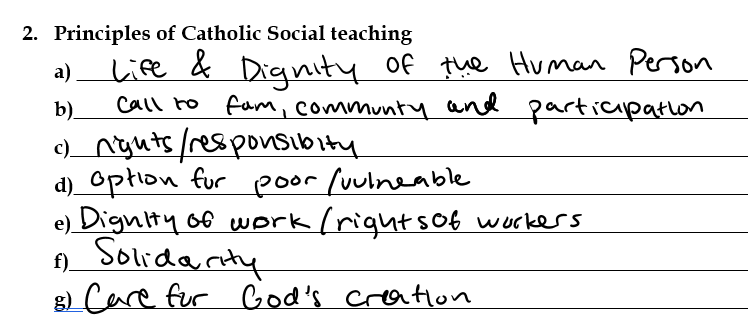catholic social justice test
1/23
There's no tags or description
Looks like no tags are added yet.
Name | Mastery | Learn | Test | Matching | Spaced |
|---|
No study sessions yet.
24 Terms
life and dignity of the human person
In our society, human life is under direct attack from abortion and euthanasia. The value of human life is being threatened by cloning, embryonic stem cell research, and the use of the death penalty. The intentional targeting of civilians in war or terrorist attacks is always wrong.
call to family, community, and participation
The person is not only sacred but also social. How we organize our society -- in economics and politics, in law and policy -- directly affects human dignity and the capacity of individuals to grow in community. Marriage and the family are the central social institutions that must be supported and strengthened, not undermined. We believe people have a right and a duty to participate in society, seeking together the common good and well-being of all, especially the poor and vulnerable.
rights and responsibilities
The Catholic tradition teaches that human dignity can be protected and a healthy community can be achieved only if human rights are protected and responsibilities are met. Therefore, every person has a fundamental right to life and a right to those things required for human decency.
option for the poor and vulnerable
A basic moral test is how our most vulnerable members are faring. In a society marred by deepening divisions between rich and poor, our tradition recalls the story of the Last Judgment (Mt 25:31-46) and instructs us to put the needs of the poor and vulnerable first.
the dignity of work and worker’s rights
The economy must serve people, not the other way around. Work is more than a way to make a living; it is a form of continuing participation in Gods creation. If the dignity of work is to be protected, then the basic rights of workers must be respected--the right to productive work, to decent and fair wages, to the organization and joining of unions, to private property, and to economic initiative.
solidarity
We are one human family whatever our national, racial, ethnic, economic, and ideological differences. We are our brothers and sisters keepers, wherever they may be. Loving our neighbor has global dimensions in a shrinking world. At the core of the virtue of solidarity is the pursuit of justice and peace. Pope Paul VI taught that if you want peace, work for justice
care for god’s creation
We show our respect for the Creator by our stewardship of creation. Care for the earth is not just an Earth Day slogan, it is a requirement of our faith. We are called to protect people and the planet, living our faith in relationship with all of Gods creation. This environmental challenge has fundamental moral and ethical dimensions that cannot be ignored.
7 themes of CTS

dignity of the human person
our inherent value as god’s children
This dignity is rooted in the belief that each person is created in the image and likeness of God, endowed with a spiritual and immortal soul, intelligence, and free will.
solidarity
Solidarity in Catholic social teaching is defined as a moral virtue that emphasizes the intrinsic social nature of the human person, recognizing the equality of all individuals in dignity and rights.
subsidiarity
The principle of subsidiarity is defined as the idea that a community of a higher order should not assume tasks that belong to a community of a lower order, thereby depriving it of its authority. Instead, it should support the lower community in case of need.
right to life
The right to life in Catholic social teaching is understood as the fundamental and inalienable right that every human being possesses from the moment of conception until natural death. This right is rooted in the belief that human life is sacred, created in the image and likeness of God, and thus deserving of respect and protection.
justice
The virtue of justice, as articulated in Catholic teaching, requires a firm and constant will to give each individual their due, which encompasses both God and neighbor.
dignity of work
The dignity of work in Catholic social teaching refers to the inherent value and worth of human labor, which is rooted in the belief that work is a participation in God's creative activity.
stewardship of creation
Stewardship of creation in Catholic social teaching refers to the responsibility of humanity to care for and manage the environment and its resources in a way that honors God's creation.
intrinsic evil
inherently wrong actions due to the OBJECT of the deed
encyclical
a papal letter to the bishops of the church
moral sins
7 deadly sins
rerum novarum
wages need to be fair, organized labor, states protect the poor, charity
Pope Leo XIII, 1891
gaudium et spes
church engaging in society, dignity of people, justice, peace, common good
Pope Paul VI, 1965
Laudato Si
care for creation, earth is in danger, climate change
Pope Francis, 2015
matthew 25
Matthew 25 carries a strong message about readiness, faithfulness, and judgment. The Parable of the Ten Virgins emphasizes personal spiritual preparedness. The Parable of the Talents teaches that we must actively use what God has given us. The Parable of the Sheep and the Goats highlights the importance of love and compassion. Together, these parables challenge us to live with purpose, knowing that Christ will return and hold us accountable for how we lived.
Are we prepared for His return? Are we using our gifts for His kingdom? Are we serving others with love? These are the questions this chapter compels us to ask as we await His coming.
genesis 1:25
we are made in the image and likness of god
rights and responsibilities states we have a right to
food, shelter, healthcare, employment, clothing